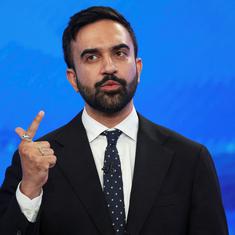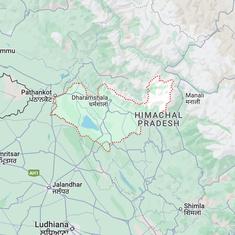“What more is there to life than love and warfare?” the Nawab asked over breakfast. Seated on his armchair in the cool morning air, the rest of us gathered around him on the floor, he was still a domineering figure.
“What is better than seeing your enemies driven before you and then taking their women to bed?” he continued in a gravelly voice, savouring his words like a jackal crunching a bone.
We’d woken, crumpled, unwashed, nostrils hardened with dust in a beige landscape, as tribesmen were kindling a cooking-fire. The night had been cold but we had ample blankets, and I was buoyed by having slept under the stars in air that smelt of rock and desert, and by waking up in the Nawab’s cave, ringed by mountains and thousands of Pakistani troops, whom the day before we’d managed to avoid.
“Have you killed anyone yourself?” I asked the Nawab, hoping to draw him out further while he was in an epic frame of mind.
“Certainly,” he said. His mouth and nose twitched as if the question smelt a bit off. “Where else would the pleasure be?”
He carefully cultivated his air of terribilita, the awe-inspiring power that had made him a legend in Pakistan. An American ambassador had averred that he would be capable of running any US state and his peers deemed that had he lived in a more red-blooded era he would have rivalled Tamerlane for conquest and slaughter. He was a potent amalgam of the primitive and sophisticated. Reputed to have murdered his first man aged 12 and to have thrown his uncle down a well not long afterwards, he had received a standard public school-type education at Aitcheson College in Lahore (an establishment set up by the British to educate the sons of chiefs); but then in adult life he’d accrued a multidisciplinary store of knowledge that would be the envy of any autodidact.
Now 80 years old and straight-backed with a well-preened moustache, his manicured hands still looked strong enough to throttle a goat.
At our previous meeting he had attributed his excellent physical condition to a regime of vegetarian food, fifty press-ups a day, and two and a half hours’ sleep each night. Of course, he had aged: thrombosis had slowed him and he was a little less robust, but only the armchair and walking stick gave him the air of a pensioner out on a spree.
After breakfast, the Nawab was ready to describe the attack that had expedited his flight from his fort to the hills; but he maintained a studied nonchalance, not wanting to give the impression that Musharraf was capable of causing him excessive inconvenience.
“Six to seven hundred shells were lobbed on my left and right, the ceiling collapsed, three people around me were killed. Some sixty were killed in that attack, including women and children,” he said flatly. “My library has been cast to the four winds.”
The previous year the Nawab had greeted Musharraf with a hail of rockets as he visited a neighbouring tribal area. Since then the conflict at times appeared to be a feud between two colossal egos.
The president, a stocky, mustachioed and pouchy-cheeked former commando with dyed black hair (left silvery at the temples to denote wisdom) was as plucky as a badger. In response to the welcoming salvo, Musharraf had threatened that “one day Bugti will die without knowing what hit him”.
The Nawab had replied: “I will give the dictator a war he will not forget.”
The Nawab now pulled a notebook from his pocket and read out a list of his enemy’s order of battle and armaments, and casualties.
“I am leading the resistance and the man with the swagger stick thinks it is an affront,” he concluded. “We are defending our homeland, our natural wealth.”
Given that he was facing a large, well-equipped force that had shown willingness to use fighter jets against his small tribal army, I asked if he was not leading his people irresponsibly towards destruction. “Let the people suffer. If people want rights sometimes you have to suffer, that is if you are a man, and not a mouse,” he retorted violently. There was a basalt core in his alert blue eyes.
With his usual enigmatic hauteur, he denied government claims he was actively organising a province-wide insurgency. “If various allied groups see me as a figurehead, how can I object?” he drawled, content with his neat evasion.
That afternoon, a surveillance aircraft flew high above us, its wings winking silverishly in the heat-faded sky. Everybody scrambled into the cave – apart from the Nawab. He raised his straw hat to it, beckoning his foe to join him. “I am in no condition to be fighting as you can see, but I am glad to be in the field,” he said after the aircraft passed, his face animated by the incident.
Talk of moving camp ensued; he was in favour of staying put but his grandson, Bramdagh, his commander in the field, was bold enough to disagree, saying our position had been compromised. They came to an agreement: we would shift in the morning.
“We will not have to set off till 8.00 am,” pronounced the Nawab, “because the Pakistan army is so decadent that it doesn’t get up until 10.00 am.”
Later that day, still in ebullient mood, he asked me: “Have you read Rebellion, Resistance and Death by Albert Camus?”
“No,” I replied, “I’m afraid not.”
“You must know that bit from Bacon about revenge being a kind of wild justice?”
“No, afraid not, Nawab sahib.”
I later looked up the section of that quotation that he had omitted: “which the more man’s nature runs to the more ought law to weed it out”. I had heard his views on justice before.
The Nawab brooked no dissent within the ranks of his own tribe so when, a decade previously, a Bugti clan leader had joined the then prime minister Benazir Bhutto’s political party, he’d had the leader’s son assassinated at an election meeting. That clan, whose allegiance was valuable because they owned the lands around the Sui gas field, reacted by killing the Nawab’s most cherished son, Salal. In retaliation he attacked the clan en force, driving 4,000 of its members from the area, and sent hit men to pursue them to the farthest corners of Pakistan. I’d met the clan leader, a greybeard with a narrow face and watery old eyes, and asked him if he wanted to kill the Nawab.
“Yes,” he replied gravely. “I have already killed his son.”
Conducting a long conversation with the Nawab was testing. With him on the one hand singing his glorious swan song, and on the other, Carlotta and me ploughing our furrow of war and the region, he began to grow irritable. Finally the narrow gauge of our journalistic questioning ignited him.
“Have you no conversation at all?” he barked as witheringly as a grande dame, brushing invisible specks of dirt off his clothes. “All you can talk about is this infernal ‘war on terror’ business.”
The acoustics of the rock reverberated remorselessly with the nakedness of this truth. In reparation I offered up, in quick succession, a couple of tidbits from my small knapsack of ready-to-go sweeteners for tyrants: La Pasionara’s exhortation to Republicans in the Spanish Civil War to “die on your feet or live on your knees”, and King Boabdil’s mother’s reproach: “do not cry like a woman for what you did not fight for like a man”. He grunted low-spiritedly. It was a temporary sating.

Excerpted with permission from Travels In A Dervish Cloak: Adventures in Pakistan, Isambard Wilkinson, Bloomsbury.










